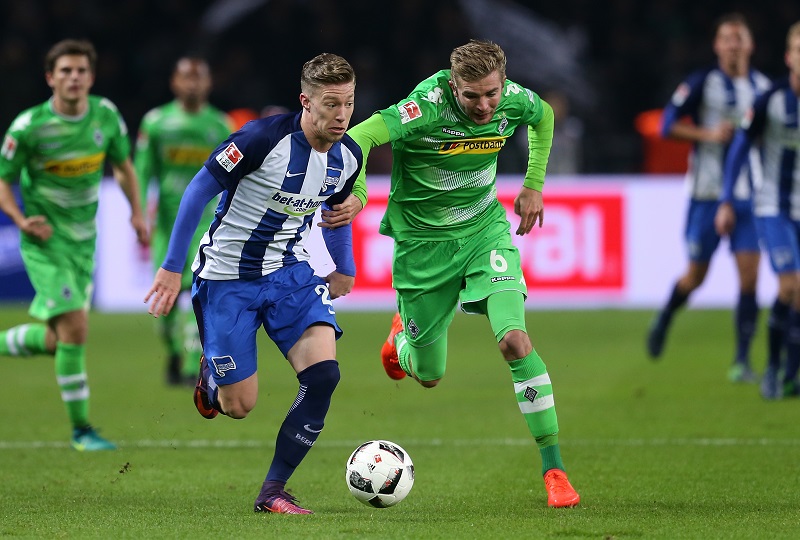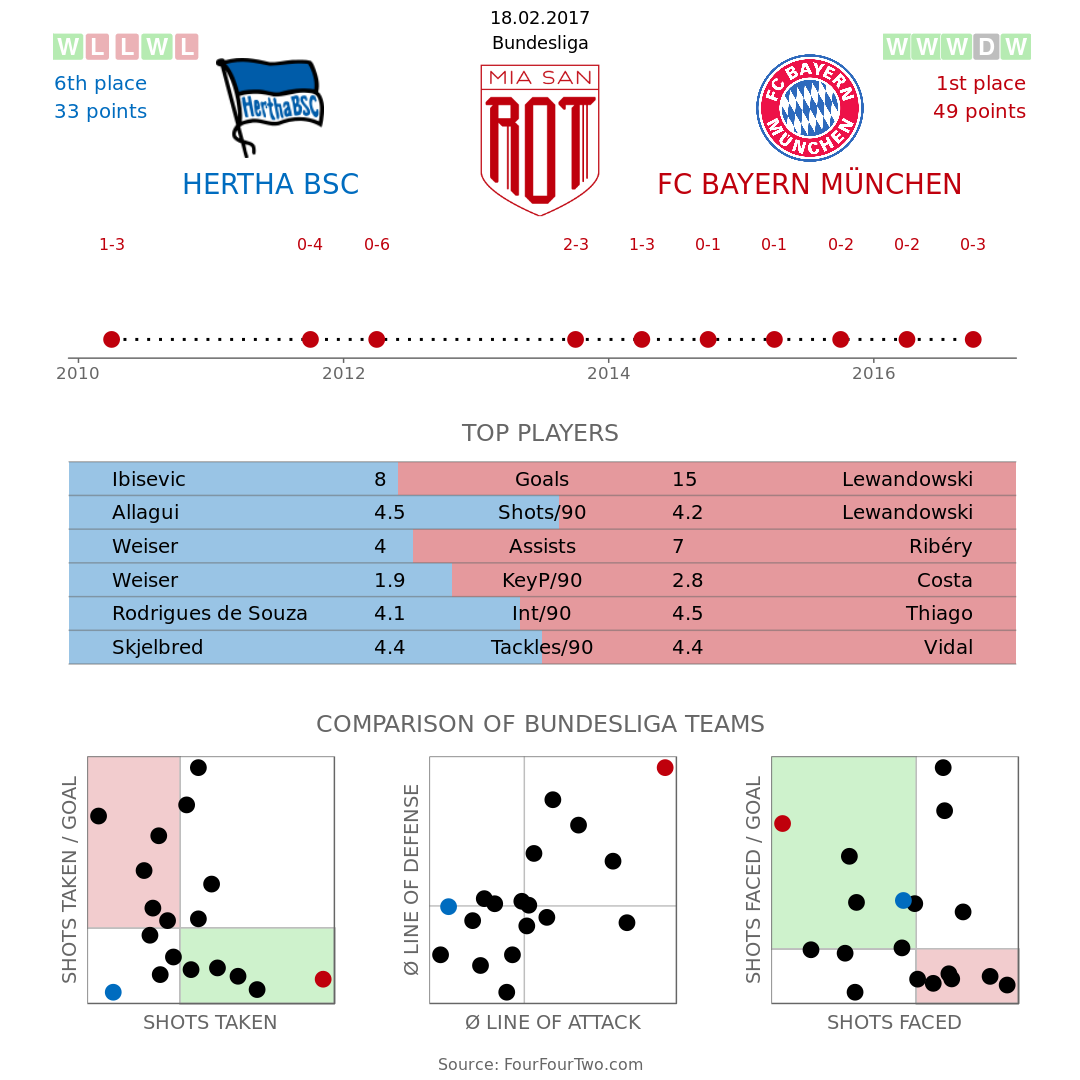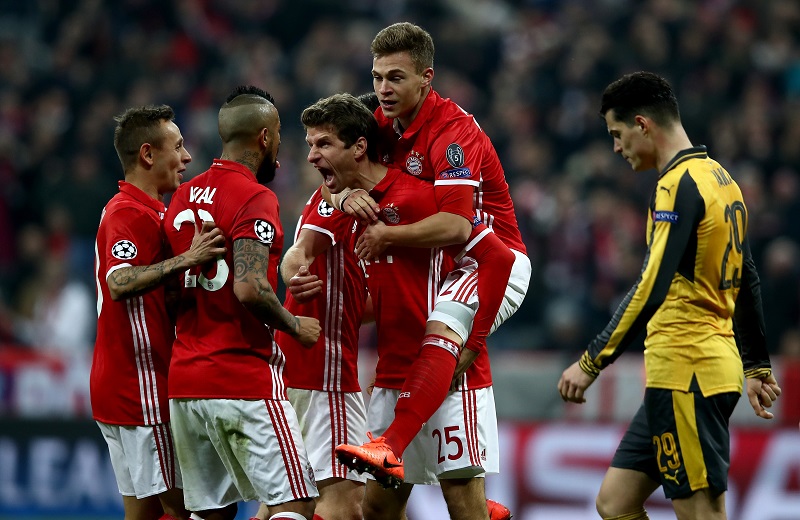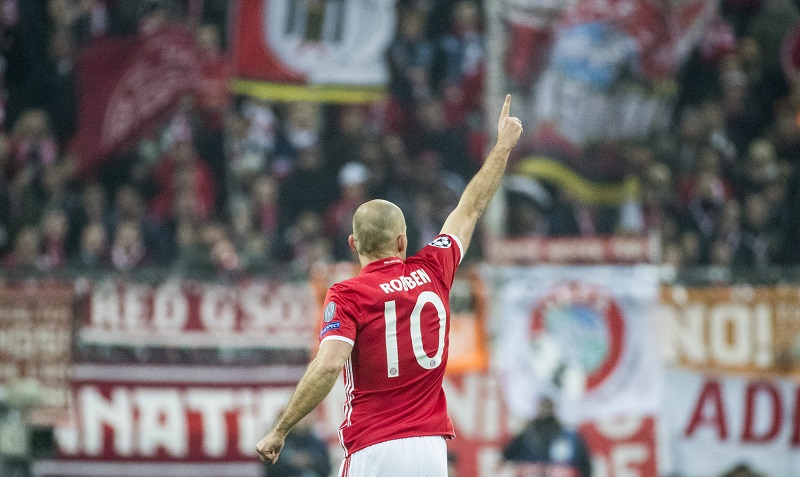Preview: Hertha BSC – FC Bayern
To get a good idea of Berlin’s current state of mind, we spoke to Marc Schwitzky. He’s editor-in-chief of Hertha Base and talks to us about Berlin’s mini crisis.
Hello, Marc. We spoke to you ahead of Bayern’s first game against Berlin this season – back then, it was a very successful Hertha we discussed. Why has this changed now, and was it to be expected?
It has at least not come as a surprise, based on Hertha’s performances after the winter break in previous seasons. Our winter training camp was focused on how to prevent another nosedive. It looks like the people in charge didn’t manage to find a good solution.
Why not?
That’s a tough one to answer, because there are many factors. The performance drop was visible before the winter break already, even the exact time it started. Ever since the game against Augsburg (matchday 11), which is ever since we’ve been missing Mitchell Weiser, things haven’t been going so well. It’s just that the teams we played against at the time, like Wolfsburg, Mainz, Darmstadt, made it possible for us to cover this up and the team got ten points out of the last seven games before the break. Not a fantastic quota, but one that was good enough to hide the problems that were already starting to emerge.
You mentioned losing Weiser. Is the team that dependent on him?
In Weiser, we lost our most important field player, because he is so important for Hertha’s offensive play with his style of playing, his technique, and his speed. When Weiser was on the field, Hertha achieved ten wins, and in six of those he was directly involved in at least one goal. Plus he was involved in six of our opening goals. He’s certainly a big factor.
In 2017, the performance drop became more obvious. Surely that can’t all be due to losing one player?
After the winter break, the team couldn’t find their rhythm, they looked uninspired and disoriented in all their losses (except the DFB Cup match against Dortmund). As if the team had completely forgotten what makes them strong; collective amnesia. It would be much too easy to pin all of that on Weiser, the rest of the squad is good even without him, after all; they’re just at a low in their performances. Ibisevic has stopped scoring, Kalou looks exhausted after ten minutes, and Brooks is reckless once again – all hitting at the same time. Rune Jarstein is the only one in excellent form. What we need most, right now, is an offensive playmaker with ideas; Stocker is too erratic for the role and Darida isn’t a playmaker. At the moment, Hertha tries to achieve everything via long balls and the occasional break on the counter, but that’s just not enough for a team in the top third of the table.

(Photo: Kern / Bongarts / Getty Images)
Why is it that Hertha can’t quite take that next step to become a true top team?
Like I mentioned briefly, it’s probably the depth in our squad; we can compensate for injuries temporarily, but not over longer periods of time. Ondrej Duda, who was our star signing and intended to be our go-to player, hasn’t been able to play a single minute, but even so, Hertha fails to adequately replace a missing Weiser or a struggling Kalou.
Another thing is our lack of tactical variability, because nothing has changed in reaction to the lack of form. Hertha play exactly the same style we played in the first half of the season, just worse – in all areas. The team isn’t as compact anymore, and lost its efficiency in front of goal, which was one of the things that made us so strong. Our build-up play was never based on speed, but while it used to be cautious and unagitated, it’s now become phlegmatic and unimaginative. We’re not exactly bad in anything, just never above average. And that’s too little for a team that wants to play internationally.
Isn’t that the capital’s aspiration? To be part of the top group in the long run?
It is, and even though we’ve never been good after the winter break in recent years, we’ve at least managed to become a constant in the top half of the table. Despite the current crisis, we can’t start badmouthing everything; Hertha is still in the middle of a fantastic development. Maybe now is the time to realise that the squad just isn’t cut out for more yet. Hertha doesn’t have any extraordinary players, like other top teams. If the team plays itself into a collective high with all our best players on board, then yes, a half-season with thirty points and Hertha third in the table is possible; but as soon as a couple of players are out of form and a couple more get injured, it becomes very difficult to keep that level. I’m fairly sure that if we manage to get some good transfers in over the summer and Duda can be part of the entire pre-season training, then we will have another successful season ahead of us.
What is the team missing that prevents them from regularly hurting teams from the top third of the table?
It’s partly the courage to actually want to attack. Too often, Pal Dardai switches up his team against FC Bayern or recently against RB Leipzig. Suddenly, we stop believing in ourselves and hide behind a back five, or throws a couple of young talents into the mix (I’m sure you all remember Allan from the first clash this season), because apparently it doesn’t matter who’s playing. It often feels like we’re giving these games away.
Hertha proved in their games against Borussia Dortmund, in the league and the Cup, that they can be surprisingly good when they believe in themselves. In those games, the team wasn’t inferior even for a minute, and easily made up the difference in quality with fight and determination. These games are what make me optimistic for the rest of the season with the games against the league’s top teams.
Are you optimistic that the “old lady” Hertha will be able to take the next step soon?
How do you define next step? If it is to establish ourselves within the league’s top eight teams, then yes. Hertha’s executive team has become highly professional, and the team has lots of potential. It’s to be expected that our most promising players like Weiser, Brooks, and Darida will leave over the next couple of years, but if the money they generate is inveted well, the club can take the next step. The base is set up properly, and Mönchengladbach has shown us how to do it.
Let’s talk about the game against Bayern. Which tactical approach do you expect from Dardai’s team?
Pal Dardai has already mentioned that they’ll be leaving the back five at home today and playing more offensively, which makes it sound like a similar approach to that against Dortmund. I think he’ll choose the same formation as always, just a little more defensively. Hertha will play a 4-2-3-1 / 4-3-3 and put emphasis on counter attacks, which is why Genki Haraguchi, a fast and agile player, will have an important role.

(Graph: Lukas)
Bayern improved their performance against Arsenal. Do you hope that they’ll go back to their more relaxed ways in the Bundesliga?
Of course I hope that, but it’s also possible that that game was a break-through moment for Bayern and that they will now steamroll everything. First of all, it’s likely that Ancelotti will rotate some players out, which will already help Hertha. But Bayern could also take it easy against teams like Ingolstadt, so maybe it doesn’t make a difference after all. If they have a not-so-good day, don’t field their best players, and don’t have the same focus they had against Arsenal, then we’ve got a chance.
Where else do you see weaknesses in Bayern that Hertha can take advantage of?
I feel like the team has given up some of its control in midfield under Ancelotti, and that it has now become possible to outplay them there, because their backwards movement has also become more static. That leads to more one-on-one situations with the centre-backs, which is exactly what Hertha needs to look out for and then use Haraguchi accordingly.
What will be the final score?
Dardai already said that the goal is to score at least one goal. I’m giving in to my fan dreams here and say it will be a 1-1.
If I could pick a player from Berlin’s team, it would be Mitchell Weiser. Who in Bayern’s squad would you take, and why?
Like I said, Hertha need a creative playmaker, so I would definitely go for Thiago! He’s incredible at distributing balls and is even astonishing viewers with much better views in the stands or in front of TV with his ideas. Many of his passes make me think “Ah, of course!” and wonder why I didn’t see that ball coming. A player like Thiago would be immensely helpful for our currently direly unimaginative offense.
Bayern have made a big step towards the Champions League quarterfinal. The 5-1 wasn’t just the best performance of the year, it also stopped much of the criticism the team had previously received.
We mentioned in our preview for the CL game that Ancelotti is a “big game coach”. His philosophy of controlling a team’s performance so that they peak at the end of the season seems to be working. At least for the moment, because we can’t just leave it at that without looking at the good game on Wednesday in more depth.
Arsenal, the weakest opponent since Bremen?
Tactical expert Tobias Escher mentioned after the game on Twitter that, tactically speaking, Arsenal had been the weakest opponent in the Allianz Arena since Werder Bremen – justifiably so.
The Londoners were cautious, anxious, passive, and gave the German champion’s key players enough space to shine. It wasn’t really surprising, therefore, that Bayern played themselves into a goal-scoring frenzy.

(Photo: Alex Grimm / Bongarts / Getty Images)
Wenger’s team showed all of Europe how not to play in Munich. But even so there were moments where Arsenal could have taken the lead. Bayern started out dominantly, but without many great ideas, and Robben’s masterpiece goal aside, not much happened during the first half.
The lacking rhythm, the lacking tactical backbone, and all the issues from previous weeks were peeking through again. An opponent with better tactical understanding than Arsenal, who haven’t been part of Europe’s elite in a long time, would have made use of those problems early on.
In the second half, there was nothing to criticise about Bayern’s performance, but even here, Arsenal losing Koscielny and Bayern scoring from every shot on goal played an important role.
Bayern’s performance in the end should be considered “okay” or even “good” – a first step in the right direction, towards the tasks to come, and a chance to build on it.
Finding the rhythm, avoiding injuries
If there was one thing the game against Arsenal FC showed very clearly, it was this: it’s almost impossible to shift gears into full speed immediately. A different opponent would have made good use of the time that it took the German record champion to warm up.
It’s important, therefore, to now find a good rhythm and to keep the intensity up in the Bundesliga and DFB Cup, as well. To achieve that, the coach will need to find the right balance between player rotation and consistency.
Ancelotti can bring all his experience to the table in this part of the season and ensure that his team is getting ready for the big games, but at the same time avoids injuries. The team is very dependent on individual class – much more so than in previous years.
Bayern in possession are as reliant on flashes of genius from Robben, Thiago, and Lewandowski, as they are on Javi Martínez’ defensive strength when acting against the ball. It has always been like that, in a way, but now more so than ever.

(Photo: Marc Mueller / Bongarts / Getty Images)
Yet again, the victory against Arsenal was one of determination, mental strength, and individual players’ abilities, than a tactical masterpiece.
A good beginning
Mental strength, of course, is a huge bonus as the season moves into its final third. Looking at the team on Wednesday, it was obviously true. Vidal’s determination, Thiago’s passion, and Robben leading the way: the team presented itself as a unit that could cover up all problems – at least in one game – with efficiency and mentality.
Whether it can always like that remains to be seen, but it was a good beginning. In the weeks to come, the entire team is called upon to take not just that first step, but also the ones following it. The game against Hertha BSC could be the next one already and help build self-confidence.
After all, even with all of Wednesday’s euphoria: the one explosion of performance will be worth nothing if it’s not backed up and built upon due to a lack of rhythm. And with the big goals ahead, that will be crucial.
Five bold predictions
- Arjen Robben will be directly involved in at least one goal.
- Robert Lewandowski will score.
- Kimmich will be in the starting line-up.
- Hertha won’t score.
- Bayern will win this away game.
Boom! All five predictions from our Arsenal preview came true. Total: 71/135.








